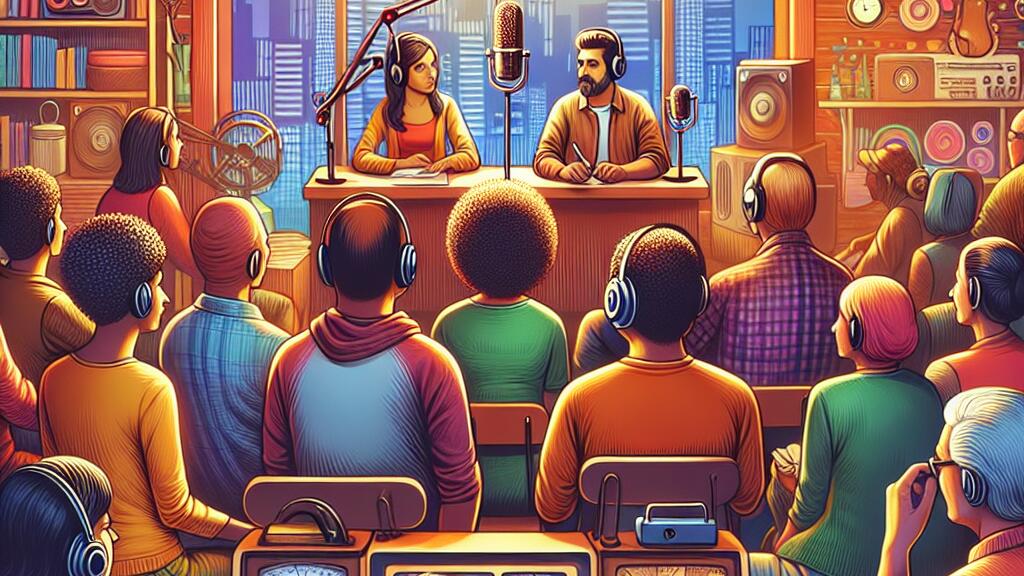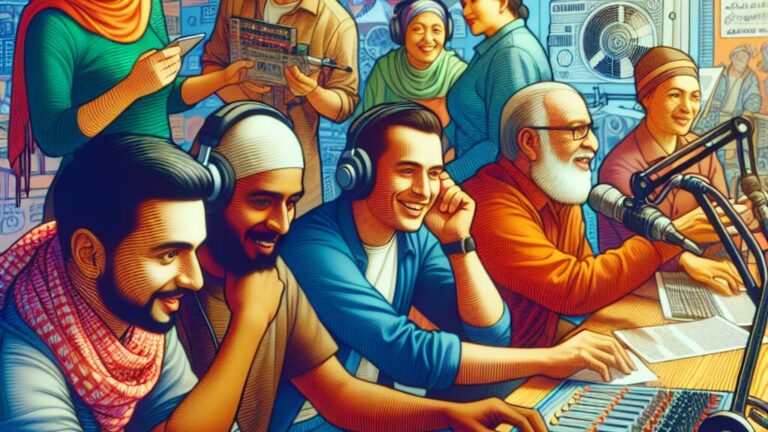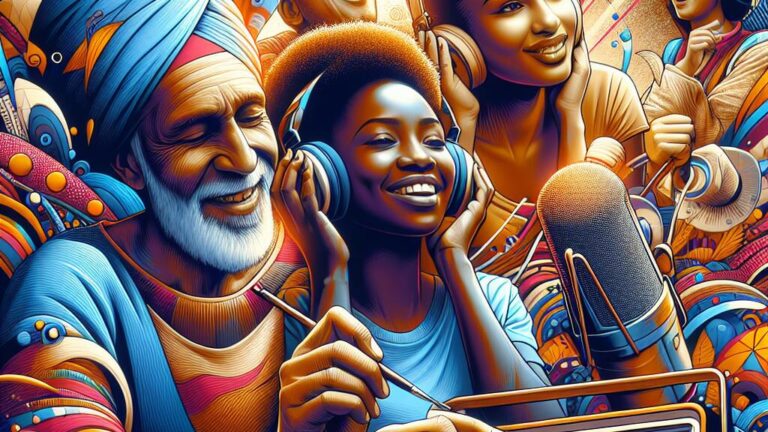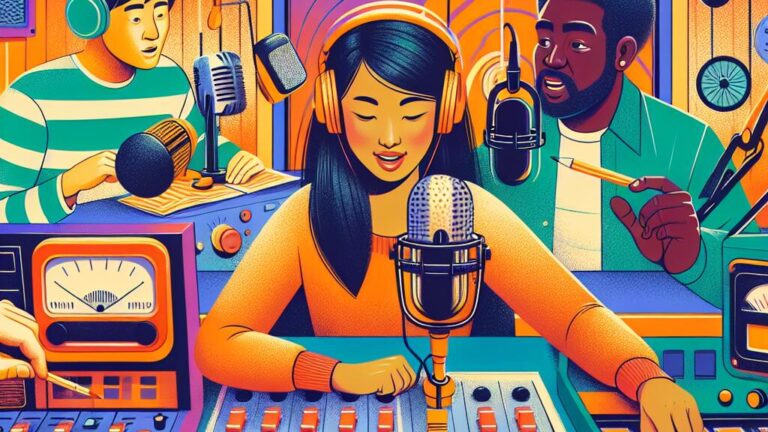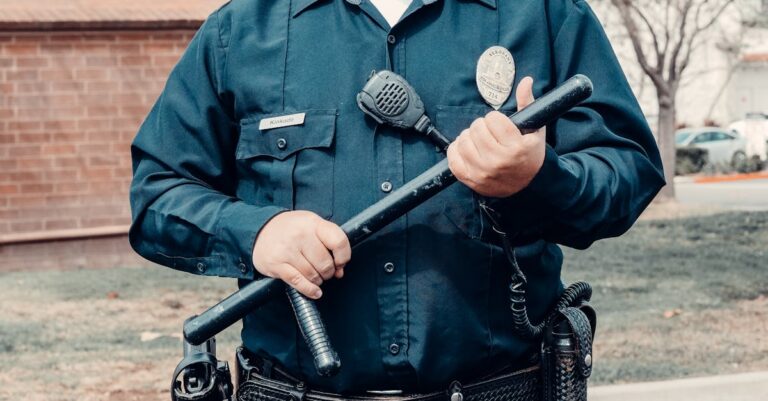Why Music Shows are Important for Community Radio
Table Of Contents
Key Takeaways
- Exploring the Significance of Music Programs on Local Radio Stations
- Examining the Cultural Influence of Music Broadcasts on Community Radio
- Analyzing the Functions and Impact of Local Radio Stations
- Promoting Engagement within Communities via Radio Platforms
Diving Deep into the Value of Music Shows on Community Radio
The significance of music shows on community radio lies in their ability to foster inclusivity and creativity within the local populace. Understanding why music shows are important for community radio involves delving into the intricacies of broadcasting through a community lens. By examining the opposite of mainstream satellite radio, where personal favorites and local ad shows take center stage, a sense of community consent is at the heart of programming. Through a case study like Laura Shenton’s style on “Hive Mind Log,” the simplicity and inclusivity in her segments showcase how music shows can be a haven for followers seeking a sense of belonging. By offering a comparison with larger media entities, like WBEZ Chicago or the heartland frequencies, the distinction between commercial corporatism and genuine community engagement becomes clear. By examining the role of radio hosts as essential storytellers, one can see how these music shows not only reflect the values and nuances of a community but also help shape its future.
The Intrinsic Connection between Community Radio and Music Shows
Music shows play a crucial role in the fabric of community radio, acting as a bridge between diverse audiences and a platform for various music styles. The essence of community radio lies in its ability to be the voice and sound of the people, and music shows contribute significantly to this by showcasing the rich diversity and talents within a community. These shows go beyond mere entertainment; they help in the creation and transmission of cultural identities and serve as a key player in fostering social cohesion and a sense of belonging among listeners. Community radio stands as a bastion against the sameness found in mainstream stations, offering a unique space where different tones, genres, and voices can be heard. In essence, music shows on community radio are not just a form of entertainment, but a reflection of the richness and uniqueness of the community they serve.
Reasons Music Shows are Crucial to Community Radios
Why Music Shows are Important for Community Radio can be understood through various lenses. These shows serve as a vital outlet for local artists and musicians to share their talents and creativity with a wider audience. In places like Iraq or London, where diverse cultural backgrounds merge, music shows on community radio contribute significantly to the celebration and preservation of different musical traditions and dialects. By offering a platform for lesser-known artists, community radio stations help in promoting inclusivity and diversity, giving a voice to those who may not have a mainstream platform. The trust built between the station and its members through music shows can also provide valuable insights for station management, ensuring that the content remains relevant and engaging.
Music shows on community radio not only entertain but also educate and inform listeners. For example, by dedicating airtime to reality game shows, educational programs, or marketing campaigns, radio stations create a dynamic environment that caters to a wide range of interests and backgrounds. The eclectic mix of genres and themes in music shows, like rebel rhythms or bedtime stories, adds vibrancy to the station’s programming and enhances the overall listener experience. Furthermore, the connection fostered between the station and its listeners through music shows can lead to increased community support and engagement, ultimately strengthening the station’s role as a medium for communication and cultural exchange.
Cultural Perspectives: The Intersection of Community Radio and Music Shows
Why Music Shows are important for community radio can be understood by recognizing the diverse realms they open up for listeners. Music shows offer a wide variety of genres and styles, creating a pleasurable listening experience that goes beyond what can be found on TV news or mainstream radio channels. In places like Manchester or Memphis, where local identity is a powerhouse, the relationship between community radio and music shows serves as a vital thread connecting citizens to their cultural roots. By showcasing local bands and artists, community radio stations become a valuable resource for fostering social cohesion and identity formation. The intersection of community radio and music shows acts as a feedback loop, with listeners engaging in events, discussions, and feedback on radio station equipment or events board shop, ultimately creating a strong sense of locality and purpose.
The Influence of Music Shows on Local Culture
Music shows play a crucial role in shaping local culture through their ability to connect with diverse audiences. These shows are vital for community radio as they provide avenues for training radio broadcasters, facilitate conversations on a wide range of topics, and offer mechanisms for audience engagement. From interviews with local bands to debates on cultural topics, music shows serve as the heartbeat of community radio broadcasting, reflecting the unique charm and personality of the community they serve. By giving voice to different cultural acts and local talents, these shows touch the hearts and minds of listeners, fostering a sense of intimacy and unity among various social groups.
The value of music shows on local culture transcends mere entertainment, as they serve as a platform for promoting cultural diversity and celebrating community identity. By featuring a wide array of genres and artists, these shows appeal to a broad audience, encompassing various tastes and preferences. Through storytelling, music selection, and live performances, music shows on community radio pick at the roots of cultural norms, challenging stereotypes and offering a space for marginalized voices to be heard. With their focus on albums, bands, and local talent, these shows contribute to the growth and development of the local music scene, providing a pocket of resistance against the homogenizing effects of mass media.
| Show Name | Host | Genre | Featured Artists | Listenership |
|---|---|---|---|---|
| Local Vibes | John Smith | Indie Rock | The Local Legends, The Underground Scene | 500 weekly |
| Cultural Rhythms | Amy Johnson | World Music | Global Beats, Local Sounds | 300 weekly |
| Community Groove | Carlos Rodriguez | Funk and Soul | The Groovy Collective, Soulful Experience | 700 weekly |
| Roots Revival | Emily White | Folk and Americana | The Folklore Band, Acoustic Roots | 400 weekly |
How Community Radio Mirrors and Shapes Cultural Identity
Community radio holds a mirror to the cultural identity of a community through its music shows. Why music shows are important for community radio is evident in how they reflect the local slang terms, accents, and even the regional weather forecasting preferences. These shows serve as a window into the diverse tastes and preferences of the community members, showcasing the rich tapestry of sounds that shape their cultural fabric. By allowing local voices to take the anchor slot, community radio creates an authentic and inclusive space that celebrates the uniqueness and distinctiveness of each community member.
The role of community radio in shaping cultural identity extends to providing a platform for emerging artists, local superstars, and even grassroots movements. Music venues may be in the limelight, but it’s the community radio airwaves that amplify the voices of those who might otherwise not find a slot on mainstream radio charts. By broadcasting a diverse mix of genres like electro, dance, and even foley box sounds, community radios celebrate the artistry and passion that define their local music scene. In this way, community radio stations become the anthem of cultural expression, fostering a sense of belonging and unity among listeners regardless of their cultural backgrounds.
The Role of Community Radio: A Close Look
Music shows play a vital role in the realm of community radio for various reasons. They serve as a catalyst, fostering social cohesion and engaging community members through a diverse range of genres and programs. Torey Malatia, a prominent figure in the industry, believes that music shows on community stations mirror and shape cultural identity, influencing local cultures and offering a platform for artistic expression. The potency of language and broadcasting medium is evident in how these shows act as a form of union among community members, transcending cultural barriers. By emphasizing the importance of music in broadcasting, community radios like the ones in Scotland or Salt Lake City provide warmth and a sense of belonging to listeners, amplifying the reach and impact of the station within the local area.
Community Radios as a Vital Link for Local Communities
Community radios serve as a vital link for local communities by providing a platform for diverse voices and perspectives to be heard. They play a crucial role in fostering social cohesion and connecting individuals through shared interests and values. Music shows are an integral part of community radio, offering a space for artists to showcase their talents, share sound advice, and engage listeners in discussions about popular culture and traditions. Through these shows, community radio stations like WEVL and Radio 64.3% serve as a beacon of inspiration, bridging gaps between various groups and creating a sense of belonging for everyone involved. This interconnected network system not only entertains but also educates, bringing about a deeper understanding of different cultures and faith perspectives within the community. The power of music shows on community radio lies in their ability to transcend boundaries and serve as a unifying force that brings people together for a common cause.
The effectiveness of music shows in community radios can be attributed to their unique ability to engage diverse audiences, from children to entrepreneurs, providing a space where everyone can find something of interest. By featuring a wide range of genres and artists, these shows cater to various tastes and preferences, ensuring that there is something for everyone to enjoy. Radio hosts, such as Lopez-Vigil and Thorzdad, act as storytellers, sharing gems of knowledge and cultural heritage, while also providing a platform for underwriters and volunteers to showcase their support for the station. Through music shows, community radios validate the voices of minority groups and individuals whose perspectives may be underrepresented in mainstream media. This inclusive approach not only enhances the station’s listenership but also reinforces its role as a connective tissue within the local community, fostering a sense of unity and cohesion that transcends cultural and political boundaries.
- Community radios serve as a vital link for local communities by providing a platform for diverse voices and perspectives to be heard.
- They foster social cohesion and connect individuals through shared interests and values.
- Music shows on community radios offer artists a space to showcase their talents and engage listeners in discussions about popular culture and traditions.
- Stations like WEVL and Radio 64.3% bridge gaps between groups and create a sense of belonging for all involved.
- Music shows educate and entertain, bringing about a deeper understanding of different cultures and faith perspectives within the community.
- They engage diverse audiences by featuring a wide range of genres and artists that cater to various tastes and preferences.
- Radio hosts like Lopez-Vigil and Thorzdad act as storytellers, sharing cultural heritage and providing a platform for station supporters.
Spotlight on the Social Importance of Music Shows
Music shows play a pivotal role in the social fabric of community radio stations. They serve as the heart of these platforms, connecting listeners with diverse sounds and genres that resonate with them on a personal level. The integration of music shows into community radios deepens the bond between the station and its audience, fostering a sense of togetherness and shared identity. Through the artistry of music, these shows bring people together, transcending differences and uniting them in their love for music. It is through programs like these that community radios truly shine, offering a platform for expression and connection that goes beyond mere entertainment.
The social importance of music shows on community radio stations cannot be overstated. These shows serve as a vehicle for cultural exchange, allowing listeners to explore new sounds and artists that they may not have encountered otherwise. By featuring a diverse range of music, from punk rock to electronic beats, community radios create a tapestry of sounds that mirror the rich tapestry of our society. Music shows break down walls and bring people from all walks of life together, offering a common ground where differences are celebrated rather than met with disgust. This inclusive approach to programming is what makes community radios the best friend of their listeners, enriching their lives with performances that speak to the soul.
Encouraging Active Community Participation through Radio Stations
Why Music Shows are Important for Community Radio extends beyond mere entertainment, acting as a vital link that fosters community engagement and connectivity. Through music shows, community radio stations have the opportunity to reach out to a diverse audience, including expatriates and residents, thus enriching the fabric of local civilisation. These shows serve as a platform where musicians can showcase their talents, forging connections between artists and listeners. With programming tailored to cater to a wide array of interests such as hobbies, sporting events, and cultural discussions, music shows become the voice of the community. As citizens tune in to their favorite radio presenters, the human voice becomes a beacon of communication medium, transmitting messages that resonate deeply with the listeners. Therefore, the role of music shows in encouraging active community participation through radio stations cannot be understated.
The Role of Music Shows in Engaging Community Members
Why Music Shows are Important for Community Radio can be understood through the lens of listener engagement and the significant role they play in fostering communication between the station and the community. Music shows provide a space where individuals can connect with the station, share their views on various issues, and feel a sense of belonging and connection to the broader community. The ability of these shows to hold the attention of listeners, whether through a diverse playlist or engaging discussions, contributes to the overall goal of community radio as a platform for expression and exploration.
In many instances, music shows act as a launchpad for community-building exercise, creating connectivity among individuals with diverse backgrounds and interests. By delving into different music genres such as big band, blues, country, or reggae, these shows serve as a conduit for shared values, roots, and experiences. The variety of topics covered, from news updates to cultural stories, allows for a wide range of listeners to find their niche, fostering a sense of cohesion and unity within the community. Through the exploration of music and the arts, radio stations like lifefm or Radio Ada can promote social values and encourage active participation from folks who care about their local community.
How Community Radios Foster Social Cohesion
Music shows play a crucial role in fostering social cohesion within communities through community radios. These shows serve as a common ground that brings together people from diverse backgrounds, uniting them through a shared love for music. By offering a platform where neighbors can interact, share their favorite tunes, and discuss music events, these programs help strengthen the sense of community and belonging. This interaction is central to building camaraderie, breaking down barriers, and promoting inclusivity among community members, making music shows a powerful tool for social integration and connection.
Furthermore, music shows on community radios help elevate the importance of localism by showcasing the talents and cultural heritage of the community. These shows provide a space for both established and up-and-coming local artists to have their music broadcasted, thus increasing their visibility and recognition. By highlighting local music events and artists, community radios contribute to the preservation and celebration of local culture, fostering pride among residents and deepening their connection to their roots. This emphasis on local content not only enriches the listening experience but also cultivates a sense of identity and appreciation for the unique characteristics of each community.
Conclusion
Community radio stations play a crucial role in connecting with local neighborhoods and fostering social cohesion. Music shows form an integral part of these stations, offering a platform for community members to engage, share stories, and showcase local talent. The symbiotic relationship between community radio and music shows goes beyond entertainment, with music serving as a vehicle for cultural expression and reflection. Through music shows, community radios not only provide a diverse range of sounds but also create a sense of belonging and unity among listeners. The importance of music shows for community radio lies in their ability to amplify voices, preserve traditions, and spark meaningful conversations that resonate with the community at large.
FAQS
Why are music shows important for community radio?
Music shows play a crucial role in connecting community radio stations with their local audience by providing a platform for sharing diverse musical content that reflects the community’s cultural identity.
How do music shows contribute to the social importance of community radio?
Music shows on community radio stations encourage active community participation and engagement, fostering social cohesion by creating a sense of shared cultural experience and promoting inclusivity within the local community.
What is the intrinsic connection between community radio and music shows?
Music shows are an integral part of community radio programming, serving as a vital link between radio stations and community members by offering a platform for local artists, musicians, and cultural content to be showcased and celebrated.
How do music shows on community radio reflect and shape cultural identity?
Music shows on community radio stations mirror the cultural diversity of the local community by featuring a wide range of musical genres and styles that reflect the unique cultural heritage and artistic expressions of the community, thus shaping and preserving its cultural identity.
What role do music shows play in encouraging active community participation through radio stations?
Music shows on community radio stations provide a platform for community members to engage with their local music scene, share their musical preferences, and contribute to the programming decisions, thereby fostering a sense of ownership and participation in the radio station among the community.
